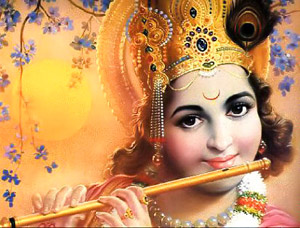Hari Guru karma divya Govinda Radhey,
mayic budhi te agamya bate dey.
(Synopsis of a talk given by Jagadguru Shri Kripalu Ji Maharaj on December 29, 2010, in Bhakti Dham, Mangarh, India, explaining this new kirtan verse)
The Vedas and scriptures and also Saints have said that there is no difference between God and His Saints.
Tasminstajjaney-bhedabhavat. (Narad Bhakti Darshan)
In some places in the scriptures, God has even regarded His devotee Saint as greater than Him. How astonishing!
Nirapeksham munim shantam… (Bhagwatam, 11/14/16)
Shri Krishna said to Uddhava, “When My Saints walk on the earth, I secretly walk behind them.” Uddhava wondered, “Why do You secretly follow them? It must be to protect them.” Shri Krishna said, “No, Uddhava, anubrajamyaham nityam puyeya, I do this so their footdust may fall on Me and purify Me. That is how loving My Saints are to Me.”
After God realisation, God bestows all His powers on the bhakta Saint. For this reason, the Saint’s actions also become divine. In other words, God Himself performs the Saint’s actions; the Saint from his side does nothing. Has a soul attained God realisation? If so, now he does nothing. And why should he do anything? He has attained everything.
When a pot is placed in water, while it is filling it makes a gurgling sound – bak, bak, bak… When it is completely full, it is silent. You can keep on dunking it under the water, but now it won’t make a sound.
There is some water that is naturally mixed in butter. When butter is heated to make ghee, it also makes a sound, pat-pat-pat… The reason for this is the water is being cooked off. When the butter is fully cooked and it becomes ghee, then this sound comes to an end. Now, no matter how much you heat the ghee, it may burn but it won’t make a sound.

Raw dough for puris

Frying puri

Fully cooked puri
Yet we have seen when people cook with ghee that it makes sounds. When does this happen? When you place raw dough in it. When this becomes a fully cooked puri, then the ghee once again is silent. If you put more raw dough in, then it will again make noise. The ghee itself is not making any noises; the ghee is causing the sound to come from the raw dough as it is cooking.
Arjuna and Hanuman killed thousands, but this wasn’t their own decision. They were following the order of Lord Krishna and Lord Ram for the salvation of the world. Both God and His Saints have performed great activities in the world. Prahlad ruled this world for 300 million years. They were great God realised Saints like this who performed worldly-looking actions like ours, but unlike our actions, their actions were not worldly at all.
Shri Krishna had 16,108 wives, and with each wife he had 10 children. These children in turn also had children. But in the midst of this, Shri Krishna had no attachment. In the end, even though the whole Yadav clan was destroyed, Shri Krishna remained ever-blissful.
How could lust, anger, greed, delusion and jealousy remain in a Saint’s heart after God realisation? If a Saint appears to exhibit these qualities after God realisation, it only for the spiritual upliftment of the souls, not for himself.
Our material intellects cannot understand this secret of a Saint’s actions. Why not? Look, if you slap someone, first you became very angry. Then an argument follows. Your anger escalates until it’s out of control and this ends with a slap. But Arjuna killed millions in the Mahabharat War with no anger at all. Instead, everywhere he only saw Shri Krishna. Hanuman saw only his beloved Lord Ram everywhere in the world.
We think, “How did they do it? I could never do that!” Yes, it is true that you couldn’t, but does that mean there is nothing beyond what you experience? You are bound by Maya; Saints are beyond Maya. You have limited powers and Saints have unlimited powers.
For this reason, in uncountable births we have seen uncountable descensions of supreme God and in spite of this we said, “This Krishna is nothing but a loafer. Day and night He keeps traipsing after girls.” When we saw a Saint like Surdas we said, “He visits a prostitute and afterwards he goes here and there playing his tanpura and chanting ‘Hare Ram Hare Ram’!”
Now that these divine personalities have left this world, we worship them. While they were here, we tried to measure their divinity with our material intellect.
We were not able to understand them because we don’t have a divine intellect. As a result, we have always committed spiritual transgressions and caused our own spiritual downfall. We ruined the opportunity of a human birth. We have done this in uncountable births. We have met innumerable Saints and descensions of supreme God. God is not senior to us; like God, we have also existed eternally. Shri Krishna appeared 5,000 years ago on this earth. We were also living at that time.
Imagine, if we had the chance to associate with a divine descension in this birth, we would still try to measure his divinity using our material intellect. We would say, “Look, that person is eating and drinking just like I do. He also gets angry. He is also acting greedy. Well, what is the difference between me and him?” Someone else says, “Listen, I heard he is a descension of God!” We would say, “Rubbish!” And if we were to see any contrary behavior from that divine personality, we start heaping even more criticism on him.
For this reason, do not apply your intellect and try to analyse the actions of God or His Saints. Gaurang Mahaprabhu said,
Jar chitte Krishna prema karai uday,
Taro vakya kriya vigyena bhujhe.
The words and actions of the God realised Saint who has attained Shri Krishna’s divine love cannot be understood even by great intellects such as Brihaspati. Only when one achieves the same divine status and becomes a Saint will one understand.
God bestows worldly possesions on a soul. This is His grace. God destroys the worldly possessions of another. This is also His grace. We can only accept that one of these situations is the result of God’s grace, not both simultaneously.
After Prahlad attained God realisation, God told him, “Rule this earth for one manvantar (300 million years)” Prahlad said, “My Lord, you want me to do this for one whole manvantar?” God said, “Yes, you have to stay in the world this long.” Prahlad thought, “After attaining God’s bliss I have to remain in this rubbish heap of a world? Anyway, it is his order. It’s fine.” Otherwise, Prahlad might have said, “What nonsense is this? I attained God realisation. I’m going to Golok abode! Why should I stay here?” Because here one doesn’t see Saints like Prahlad. The world is full of selfish and ignorant mayic souls with material attachment. And in every age only a few true Saints are on this earth.
So, Chaitanya Mahaprabhu says that since we can’t understand the words and actions of God and His Saints, we should accept and follow their teachings. When we achieve their divine status, then we will understand everything.
A child of four years can’t yet understand how he is the child of both his mother and father. He wonders, “Why do they both call me ‘son’?” His mother and father also can’t explain this to him as he still is unacquainted with the facts of life and has no sensual desire. When he reaches 16 years of age and starts having these feelings, then he’ll realise, “Oh, so that’s how babies are born! Why didn’t they explain this to me before when I was younger? Instead they kept shooing me away and told me to stop talking nonsense!” Now his understanding comes naturally.
Similarly, when you arrive in the class of a God realised Saint, who even while performing action remains free from all karmic consequences, you will naturally understand. You do have some degree of understanding of this in the world, but you keep forgetting. When you love someone, you hug them to your chest. You hug your husband, wife, mother, father, sister, brother, and child. But the feeling you experience while hugging each of them is different.
A person is observing a man and woman hugging on the street. If he has a pure mind, he will have pure thoughts about this. If he has an impure mind, he will immediately criticise them, “Look at that promiscuous behavior! Hugging on the street!” What is the actual situation? A brother lost his sister for some days. When he finally found her, he couldn’t control his joy and embraced her. But the onlooker observing this is thinking something quite the opposite.
When we make such wrong appraisals of worldly behavior, then what would happen in our analysis of a Saint’s actions? We just cannot understand their actions. For this reason Chaitanya Mahaprabhu said not to apply one’s intellect in such areas that could lead to one’s spiritual downfall.
When you are studying in school, you don’t attempt to imitate the teachers. If a student sat in the teacher’s chair and made the teacher sit on the floor with the other students, what would happen when the teacher asks the imitation teacher a question? That child has no knowledge.
Thus we should always remain careful not to have a negative or judgemental attitude towards God and His Saints.
© Radha Govinda Samiti and Bhakti Bliss
Read Full Post »











